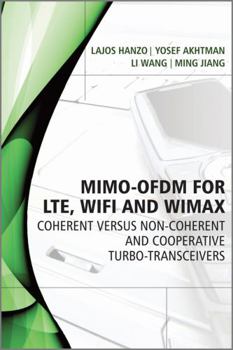MIMO-OFDM for LTE, Wi-Fi and WiMAX: Coherent Versus Non-coherent and Cooperative Turbo-transceivers
This monograph collates the latest techniques in a number of specific design areas of turbo-detected MIMO-OFDM wireless systems. As a result a wide range of topical subjects are examined, including channel coding and multiuser detection (MUD), with a special emphasis on optimum maximum-likelihood (ML) MUDs, reduced-complexity genetic algorithm aided near-ML MUDs and sphere detection. The benefits of spreading codes as well as joint iterative channel and data estimation are only a few of the radical new features of the book.
Also considered are the benefits of turbo and LDPC channel coding, the entire suite of known joint coding and modulation schemes, space-time coding as well as SDM/SDMA MIMOs within the context of various application examples. The book systematically converts the lessons of Shannon's information theory into design principles applicable to practical wireless systems; the depth of discussions increases towards the end of the book.
Discusses many state-of-the-art topics important to today's wireless communications engineers. Includes numerous complete system design examples for the industrial practitioner. Offers a detailed portrayal of sphere detection. Based on over twenty years of research into OFDM in the context of various applications, subsequently presenting comprehensive bibliographies.




